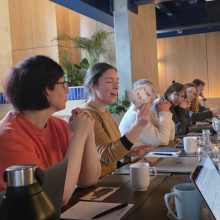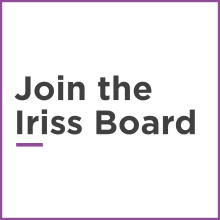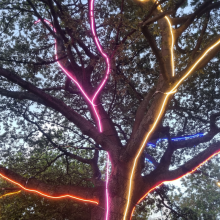In a fast-paced environment, the instinct can be to act quickly, but without a shared understanding of where we have been, we could move in directions that are not fully aligned or as effective as they could be. In having a learning week, we are valuing and including reflective practice into our work, to help us be more strategic, more collaborative, and ultimately, more influential in the change we seek to create.
At Iriss, our diverse range of projects and our autonomy offer both opportunities and challenges. One of the challenges is ensuring that the work we undertake does not exist in silos, that we are not duplicating efforts, and that we fully understand how different strands of work intersect. Understanding the intersections of our work also strengthens collaboration. When we take the time and space to identify overlaps and connections, we create opportunities for shared learning. Without this awareness, we could start projects that others may have already undertaken or miss the chance to incorporate the expertise of colleagues who could contribute. Keeping an eye on how different pieces connect, asking, ‘How does this speak to that, and how does that inform this?’ can help us make sense of what we are learning and how it informs future action.
One example is the time we would like to explore the implications of our recent research with ASP national and sub implementation groups. Rather than immediately jumping to the next steps, we are pausing to reflect on what the findings mean for the groups who have worked hard over the last two years on areas including Self Evaluation, Chronologies, the Lead Officer Role, and Advocacy of Supported Adults. This also includes exploring how this research links with other key reports such as the Biennual Report, Inspection Reports, the Minimum Dataset, and the CSWO report. By doing this, we can ensure that our work is both complementary rather than duplicative.
Taking this time for reflection allows us to ask important questions:
- What are we learning from our work?
- Where are the gaps in our understanding and approach?
- What should we stop doing to free up capacity for more influential work?
- What new approaches or projects should we start exploring?
Learning week can help to explore answers to these questions across different areas of work and identify opportunities for alignment. By engaging in collective sense-making, we ensure that our learning informs not only our own next steps but also the possible direction for our partners, because this is not just an internal exercise, it has meaningful implications for the practitioners and strategic leaders we work alongside. By making sense of our work in a broader context, we can better support our partners in their roles and help them make informed decisions. Ultimately, this approach strengthens our collective influence, ensuring that the people they support benefit from well-coordinated and thoughtful initiatives.
Another key part of this process is staying curious and being present. Curiosity drives us to ask better questions, explore different perspectives, and remain open to new possibilities. Being present allows us to fully engage in discussions, listen actively, and appreciate the nuances of our work. As we continue to explore new ideas and approaches we hope to reflect more (in future blogs) on how these qualities help us navigate complexity, build stronger relationships, and ensure that we continue learning and adapting in meaningful ways.



